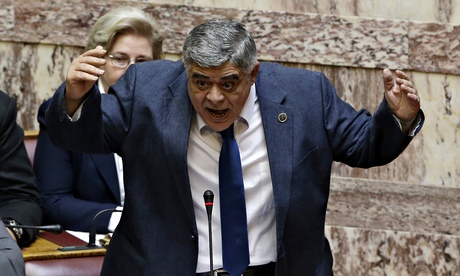Helena Smith in Athens theguardian.com, Thursday 5 June 2014
Nikos Michaloliakos condemns 'pseudo-democrats' in hostile speech after being stripped of political immunity
Nikos Michaloliakos speaking at the Greek parliament on Wednesday. Photograph: Thanassis Stavrakis/AP
Hurling abuse, telling other MPS to shut up and describing himself as an "unrepentant nationalist", the imprisoned leader of Greece's neo-fascist Golden Dawn party sent shudders through the country's political arena on Wednesday as deputies in the Greek parliament voted to prosecute the politician on charges of operating a criminal gang.
Nearly nine months after being incarcerated in Athens's high-security Korydallos jail, Nikos Michaloliakos made his first appearance in public in combative mood. It was the first time a leader elected by democratic process has been escorted into parliament in handcuffs and under armed guard.
As diehard Golden Dawn supporters outside the building, – shouted "you have made a mockery of them all, great leader" a wan-looking Michaloliakos blasted MPs who had assembled in the chamber with the purpose of stripping him of his political immunity.
"I am the head of Greece's third largest party," he railed, reminding deputies of the far rightists' unexpectedly strong showing in recent European and local elections. "Shame on you, you pseudo-democrats, for setting up this plot against us … You have drawn up charges with your eyes on opinion polls. You are a sad minority government. You put me in prison for no reason. But I do not fear prison. My handcuffs are a badge of honour."
Of the 224 MPs present, an overwhelming 223 voted in favour of formally instituting legal proceedings against Michaloliakos. The party's second-in-command, Christos Pappas, and a leading Golden Dawn MP, Yannis Lagos, were similarly stripped of their immunity. All three men – along with around 30 other prominent party cadres – are in prison pending trial later this year.
Their appearance, described by senior officials as "troubling" for a government clinging to power with a majority of two, is a foretaste of the tactics the extremists are expected to pursue in the months ahead.
The far-rightists' transformation into a nationalist, patriotic group – from the outset they have denied they are Nazi sympathisers – has seen them discard the violence that catapulted them into parliament on a wave of anti-immigrant sentiment in June 2012. The neo-fascist party has instead focused on the "rotten" political establishment widely blamed for twice-bailed-out Greece's economic meltdown.
The party's anti-European, anti-Semitic, anti-immigrant and homophobic rhetoric has won increasing appeal among middle class Greeks, with Golden Dawn winning 9.4% of the total vote and three MEPs in the European elections last month.
The showing, a 25% increase on its performance in national elections two years ago, was attributed as much to swaths of the population being pauperised by the crisis as to growing numbers being unconvinced by the charges against the group.
In perhaps the most telling turnaround, the extremists appear to have won over more educated Greeks as well as the working classes in areas once considered left-wing strongholds in Athens, the region worst affected by the crisis.
Playing on those sentiments, Yannis Lagos, the MP accused of ordering the murder of Pavlos Fyssas – an anti-fascist rapper whose death spurred the crackdown against the party – insisted nothing had been found to support the accusations against Golden Dawn.
Telling MPs the organisation had "lots of evidence" to prove the judicial investigation was politically motivated, he said: "If we go to trial we will make a mockery of you across Europe. Golden Dawn is not going to be erased – ever."
The two magistrates investigating the group have received death threats, as has the prosecutor who ordered the inquiry.
Human rights groups say it is imperative that the inquiry is carried out to the "highest judicial standards".
Tad Stahnke of Human Rights First said: "Golden Dawn's popularity, even after revelations about its Nazi ideology and its alleged involvement in two murders and dozens of assaults, underscores the need for rigorous and credible prosecution that meets the highest European judicial standards and is not tainted by accusations of political motivation."
![The [Greek] European Tragedy](https://blogger.googleusercontent.com/img/b/R29vZ2xl/AVvXsEiWKI5s90SFm1wWTk6bs4p7CgslaC2SnYPsrZhb-B-smOufNNCSxCvpBLI9hOB-LsXZjir_PNmEiMk2-E62F3xkg96IoC6QFAaZAnPRTVH340IN9WBRmWJqPkjWlgyRj3zpALp7h6hvA58/s920/GkBack_new.jpg)
